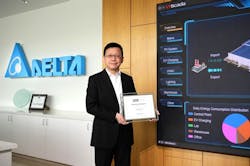LEED honors Delta Electronics U.S. HQ with Zero Energy Building Certification
Digital energy and technology firm Delta Electronics’ headquarters for Americas operations has joined a small group of buildings earning LEED Zero Energy certification from the U.S. Green Building Council.
The LEED—for Leadership in Energy and Environmental Design—Zero Energy certification is only the second such building distinction awarded to facilities in the Silicon Valley Bay Area of northern California. Delta’s Americas HQ is in Fremont, Calif.
The certification is for buildings which generate as much electricity as they consume. The Delta Electronics HQ includes a new solar photovoltaic carport and 330-kWh Delta energy storage system.
“Fremont has been Delta’s home in the Americas for over 30 years, so it is an honor for us to contribute to our community with the environmental and social benefits of the city’s very first LEED Zero Energy green building,” Kelvin Huang, president of Delta Electronics Americas, said in a statement. “With its net-zero energy capabilities, our Americas HQs green building will contribute even further to Delta’s RE100 initiative, which is a promise to power our worldwide operations with renewable electricity by 2030. By developing smart energy-saving solutions capable of fostering green buildings and sustainable cities, Delta demonstrates that its ESG-embedded business model can bolster mankind’s environmental goals.”
The Delta facility can generate more than 1.4-million kWh of renewable electricity through the 616-kW rooftop solar array and a recently constructed 504-kW bi-facial PV carport system. Both are connected with Delta’s own PV inverters to convert direct current to alternating current.
The energy output should equal 100 percent of the buildings’ consumption over a full year, according to the company.
See our full coverage of Microgrids and DERs in the C&I Energy Transition
Delta also installed an enhanced energy efficiency solution to its data center cooling system. The dedicated economizer is supported by Delta DC brushless electronically commutated fans and variable frequency drives for the heating, ventilation and cooling applications.
Those improvements have lowered the data center energy usage impacts, according to Delta.
“Delta Electronics sets another milestone as only the second facility in the entire Bay Area to achieve LEED Zero-Energy,” said Lily Mei, Mayor of Fremont. “As one of the greenest cities in the nation, we're proud that Delta Electronics continues to showcase sustainability through thoughtful application of technology, including using its Fremont facility as a proving grounds for many of its own products while working through pandemic disruptions to invest even further in our community.”
Taiwan-based parent company Delta Electronics is a global manufacturer of industrial and computer fans and power systems components. It has more than 200 facilities worldwide.
Officially, so-called "net zero buildings" are still rare but growing in scope in the U.S. Boston University recently contracted Schneider Electric to manage its geothermal-connected Computing Center on campus.
About the Author
EnergyTech Staff
Rod Walton is head of content for EnergyTech.com. He has spent 17 years covering the energy industry as a newspaper and trade journalist.
Walton formerly was energy writer and business editor at the Tulsa World. Later, he spent six years covering the electricity power sector for Pennwell and Clarion Events. He joined Endeavor and EnergyTech in November 2021.
He can be reached at [email protected].
EnergyTech is focused on the mission critical and large-scale energy users and their sustainability and resiliency goals. These include the commercial and industrial sectors, as well as the military, universities, data centers and microgrids.
Many large-scale energy users such as Fortune 500 companies, and mission-critical users such as military bases, universities, healthcare facilities, public safety and data centers, shifting their energy priorities to reach net-zero carbon goals within the coming decades. These include plans for renewable energy power purchase agreements, but also on-site resiliency projects such as microgrids, combined heat and power, rooftop solar, energy storage, digitalization and building efficiency upgrades.
